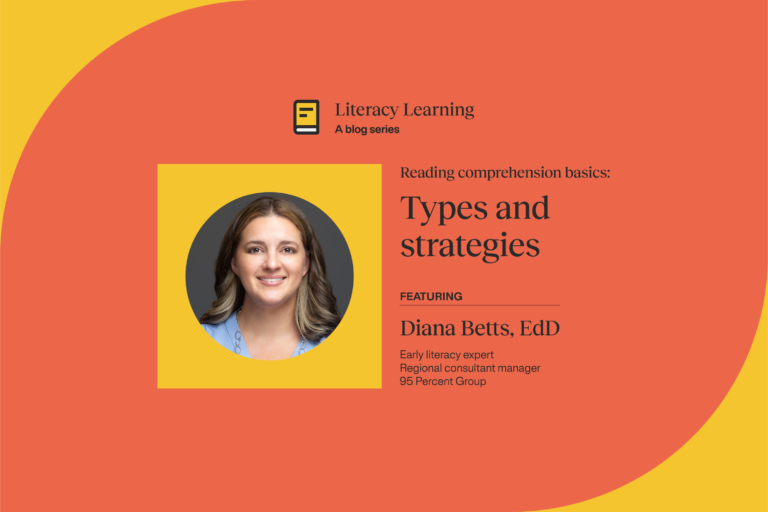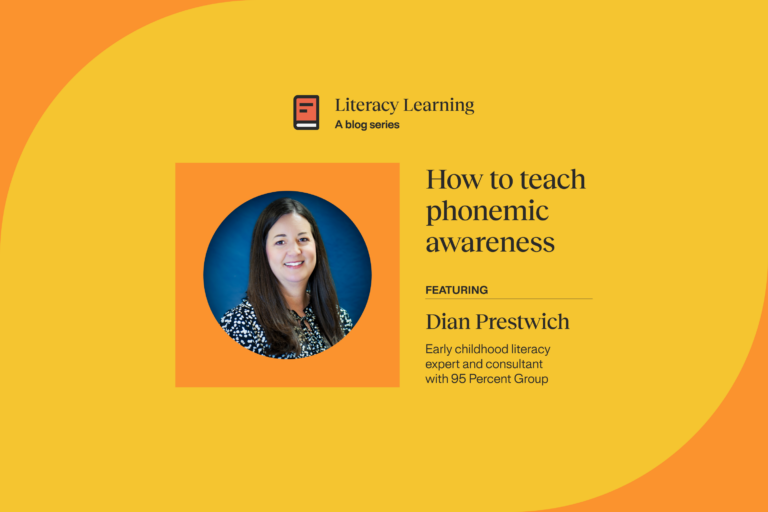Courageous leaders: Accelerating your impact as the lead literacy learner with Laura Stewart and Mitchell Brookins (Part 2 of 3)

In part 2 of our new post in the Courageous Leaders Webinar Series, Laura Stewart, Chief Academic Officer at 95 Percent Group, and educational consultant Mitchell Brookins, PhD, discuss courageous leadership.
Laura Stewart:
Let’s talk about leadership. Can you share with us your journey into leadership and then how you’ve transformed from being a leader yourself to leadership coaching?
Mitchell Brookins:
I started my leadership journey in 2011. I shared being a district coach of RTI of literacy. I did not realize at first that you have to understand teachers and how they learn and how to motivate them to want to do the things you want them to do as a coach. I had to learn that. I think the best teachers were teachers. So I’m better at that now. But I realized that I really wanted to have that experience at the schoolhouse. So that’s when I left that district leader role and came to the school.
I began supporting grades 3 to 5. I also had a school that was a bilingual school as well. And I spent a lot of time just really analyzing instruction, analyzing the evidence base, and learning that improving the school is actually complex work. And it’s not just to give teachers a resource, a curriculum. It’s not just “Here’s your assessment.” It is a lot of heavy strategic thinking and planning that goes into how you move the score from point A to point B.
I lived by people work by day and paperwork by night. At night—that was time that I had to process. I had to think strategically about my moves the next day because I knew that when I was in the school, my every waking moment was to be with teachers. I had to be sure that they’re supported and ensure that the instruction was sound. I had to worry about what parents were going to say when they’re coming with their complaints. It’s a whole lot of things that happen in the school day. But my leadership journey really just taught me that strategic thinking and planning is a critical component of the work.
So now, as a consultant, I try to support principals in five areas. That first area is the knowledge base. That is, as a leader, do you understand what high-quality instruction looks like? Let’s get more specific because everyone wants to say high-quality instruction, but in foundational skills instruction—what are the routines that should be happening in the classroom that align with structured literacy? What are the highest leveraging, highest yielding routines for language comprehension? You have to know those routines. But beyond knowing those routines, the principal also has to consider: Are my assessments going to give me the information I need on how well this change effort is working? Do I have screeners? Do I have diagnostics? Am I analyzing those pieces?
And then, beyond assessments, what about the curriculum? As a leader, you can’t just say, “Here is Wit and Wisdom. Here is Fundations.” Have you anticipated where your teachers are going to struggle with this curriculum? Do you have a plan for how you’re going to support them through it? So it’s really ensuring they are fluent with the knowledge of the evidence base—high yielding routines, knowledge of assessments, curriculum.
And I’ll even push one more, Laura. It’s knowledge of adult learning. They’re working with adults. So often this conversation stays at the science of reading—leaders need to know the science of reading—yes, and leaders need to know how to lead a change effort. They need to know how to work with people. They need to build capacity. Leaders are capacity builders, so as much as I have to arm them with the knowledge of the science of reading, I have to arm them also with the capacity building skills, right? So I would say, that’s where I start with them because you can’t lead anything that you don’t know anything about.
Then I do take them down into the next step of the data. And I’ll say this. One of the things that I have seen as a gap when it comes to data is this—once they’ve done the spreadsheet and they’ve managed to do the action plan, they need to consider these questions: Did you actually read their action plan? Did you give them feedback on that action plan? Do you know if that action plan is actually strategic? And even more, did you ask the teachers to set short-term goals and outcomes? Because what’s the point of making teachers do all this action planning and analyzing assessments if you’re not going to have short outcomes to let them know if it is actually working? So, are you giving them feedback? Do they have goals so that you can actually track the growth over time? And then finally, are you making consistent time to analyze the outputs?
Laura Stewart:
You said so many great things. I’d like to take a minute to recap what you’ve just said. First of all, you mentioned being a leader is not just giving somebody some curricular resources. You have to look at it from a systems perspective, and the systems include strategic planning around the whole system. So, really, what you’re describing is transactional change versus transformational change, and we, as leaders, are transformation agents. We want to be transformational leaders in order to transform our systems.
And then, you talked about the knowledge base of the science of reading. That’s important. But we have to know the science of instruction, the science of teaching, and then we have to arm our teachers with consistent routines that are high impact. We have to make sure that we’re using the right assessments that give us the right data. But it’s not enough just to collect the data. What are we doing with the data to create an action plan? And then, how are we following up on it?
And on the idea of progress monitoring, it is really a window into our instruction. It’s actually less about the child and it’s more about our instruction—is our instruction having the desired outcomes? And then as leaders, we need to know about adult learners and about capacity building.
Mitchell Brookins:
We talked about the data piece—I could extend that for a moment. What I’m also seeing, too, is we’re so focused on the screener and the diagnostic data. And we see that as the data. But I’m also working with leaders to say no, “What about teacher performance data? You need to go into the classroom. You need to have a checklist of the instructional routines and the actions that teachers are taking, and you need to be assessing and collecting that.” So one of the key things that I do with leaders is this—on a biweekly basis, we have an instructional leadership team meeting. And guess what? We’re going to look at the observational data.
How are teachers doing? What’s the part of the routine they’re not getting? Why? Because you want to create what I would call evidence-backed professional development. And that means whatever you are putting before teachers for their professional development, you have to come to the table and tell teachers, “Okay, this is aligned to observational data. We’re doing this because I did not see this. You need to grow in this.” Right? And so the professional learning has to be linked to that observational data, and not only just the professional learning, the coaching! Right? And that’s a piece that I’m not seeing strong in schools. It’s as if teachers are just left to implement the curriculum, and they’re going to get a drive-by quick feedback: “Okay, let’s talk about what you need to do better.”
But in actuality, if a teacher is not performing the instructional routine well, that means that teacher needs some instruction. It means they need to have a coaching debrief that’s not just sitting and talking to the coach. You get up, role play that routine. Coach, give that person that feedback, right? And as a literacy leader, If you’re the principal, how are you monitoring that coaching system? How are you monitoring the professional learning system? So, as a leader, you can’t monitor if you’re not going to the common planning time and seeing how it’s delivered. You can’t monitor coaching if you’ve never sat in the coaching debrief to see how your coach is actually delivering that service. As a literacy leader, you have to monitor the entire system and the entire structure.
Laura Stewart:
I think what you’re talking a lot about here is accountability. And that’s not a bad thing. It’s how are we helping people be accountable for the shared goals? We have shared goals, so how do we hold ourselves—all of us—accountable for these shared goals? To do this, I think you have to establish trust. How do you establish trust? How do you coach your leaders into establishing trust? I know that’s a question a lot of people have.
Mitchell Brookins:
Trust, trust, trust, trust. I understand that even as a consultant, leaders don’t have a lot of time to talk to me. I need to be efficient. I’ve got to keep it real with them. I have to be authentic with them, but they also have to see me as someone who gives them a pathway that’s clearer. And so I would say, I get quick trust because one, my mouth will just say the thing that nobody else wants to say. And I think that lets people know that I’m human. And people have to have that human connection. So it’s okay for me to say, “Guess what? I know this Tier 1 curriculum is not going well, it’s not working. We see it. It’s okay.”
It’s about establishing that with them but also working with them to clarify their own priorities. So it’s not about me going to that leader and having my own agenda. It’s me listening to them, helping them clarify: What are you passionate about? What is the data showing? What’s the high priority? Clarifying that for them, right?
And then, here’s the biggest piece. I have to do the work. So a leader has to see: When I talk to Mitchell and he says that we need to have an observation checklist, I can say, “Mitchell, are you helping us make a checklist?” or “Mitchell, you said that teachers don’t know how to do X, Y, and Z. Well, Mitchell, are you gonna help us figure out how to make that plan and do that development?” So yes, I’ll look at the PowerPoint for them. I’ll look at the checklist for them. I’m a partner to them. I think when you talk about trust, I have to quickly let them know that I’m their partner in the work.
About 95 Percent Group
95 Percent Group is an education company whose mission is to build on science to empower teachers—supplying the knowledge, resources and support they need—to develop strong readers. Using an approach that is based in structured literacy, the company’s One95™ Literacy Ecosystem™ integrates professional learning and evidence-based literacy products into one cohesive system that supports consistent instructional routines across tiers and is proven and trusted to help students close skill gaps and read fluently. 95 Percent Group is also committed to advancing research, best practices, and thought leadership on the science of reading more broadly.
For additional information on 95 Percent Group, visit: https://www.95percentgroup.com.



